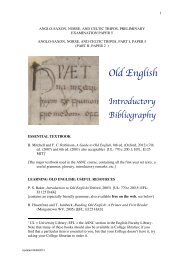Scandinavian history in the Viking age - Department of Anglo-Saxon ...
Scandinavian history in the Viking age - Department of Anglo-Saxon ...
Scandinavian history in the Viking age - Department of Anglo-Saxon ...
Create successful ePaper yourself
Turn your PDF publications into a flip-book with our unique Google optimized e-Paper software.
<strong>Scand<strong>in</strong>avian</strong> History <strong>in</strong> <strong>the</strong> Vik<strong>in</strong>g Age<br />
an annotated list <strong>of</strong> Norwegian k<strong>in</strong>gs that refers for its authority to <strong>the</strong> work <strong>of</strong> Sæmundr (B252). Text:<br />
(B510):579-89<br />
[B561] Of poems composed <strong>in</strong> honour <strong>of</strong> <strong>the</strong> cult <strong>of</strong> sa<strong>in</strong>t Olaf, E<strong>in</strong>ar Skúlason’s Geisli ‘sunbeam’ stands<br />
out, for text see (B510):459-73<br />
On <strong>the</strong> ma<strong>in</strong>tenance <strong>of</strong> <strong>the</strong> skaldic tradition <strong>in</strong> learned and elite contexts <strong>in</strong> twelfth- and thirteenth-century<br />
Iceland, see:<br />
[B562] G. Nordal, Tools <strong>of</strong> literacy: The role <strong>of</strong> skaldic verse <strong>in</strong> Icelandic textual culture <strong>of</strong> <strong>the</strong> twelfth<br />
and thirteenth centuries (2001) [ASNC]<br />
Eddaic verse<br />
By contrast to skaldic verse, Eddaic poetry is largely anonymous, mythological, and timeless; it is<br />
extraord<strong>in</strong>arily difficult to p<strong>in</strong> down when or <strong>in</strong> what context <strong>the</strong> various poems that make up <strong>the</strong> corpus<br />
might have been composed or revised.<br />
Reference<br />
For bibliographical guidance to older material, see:<br />
[B570] H. Hermansson, Bibliography <strong>of</strong> <strong>the</strong> Eddas, Islandica 13 (1920), plus suppl. by J.S. Hannesson 37<br />
(1955) [UL 752:4.c.1.13, suppl. 752:4.c.1.36]<br />
Glossaries<br />
The major dictionaries <strong>of</strong> Old Norse (A90) are <strong>of</strong>ten helpful, but see also:<br />
[B571] R. Kellogg, A concordance to Eddic poetry, Medieval texts and studies 2 (1988) [UL R752.50]<br />
[B572] B. la Farge and J. Tucker, Glossary to <strong>the</strong> Poetic Edda based on Hans Kuhn’s Kurzes<br />
Wörterbuch, Skand<strong>in</strong>avistische Arbeiten 15 (1992) [UL 752:01.c.10.15]; based on (B587)<br />
General guides<br />
[B574] P. Acker and C. Larr<strong>in</strong>gton (edd.), The Poetic Edda: essays on Old Norse mythology (2002)<br />
[B575] R.J. Glend<strong>in</strong>n<strong>in</strong>g and H. Bessason, (edd.), Edda: a collection <strong>of</strong> essays, University <strong>of</strong> Manitoba<br />
Icelandic studies 4 (1983) [UL 599:01.c.5.4]<br />
[B576] J. Harris, ‘Eddic poetry’, (B233):68-156<br />
[B577] J. Kristjánsson, Eddas and sagas: Iceland’s medieval literature, transl. P. Foote (1988) [UL<br />
752:16.c.95.32]<br />
On transmission and function <strong>in</strong> particular, see:<br />
[B578] T. Gunnell, The orig<strong>in</strong>s <strong>of</strong> drama <strong>in</strong> Scand<strong>in</strong>avia (1995) [UL 752:05.c.95.55]<br />
[B579] B. Fidjestøl, The dat<strong>in</strong>g <strong>of</strong> Eddic poetry: a historical survey and methodological <strong>in</strong>vestigation,<br />
ed. O.E. Haugen, Biblio<strong>the</strong>ca Arnamagnæana 41 (1999) [ASNC]<br />
Eddaic verse and mythology<br />
For more general surveys <strong>of</strong> Old Norse mythology, see (K1 ff., K20 ff.). A few <strong>of</strong> <strong>the</strong> contributions<br />
focuss<strong>in</strong>g more specifically (if that were possible) on Eddaic verse are:<br />
[B580] J. Kristjánsson, ‘Heið<strong>in</strong> trú í fornkvæðum’, (B261):99-112 (E.s.)<br />
[B581] U. Dronke, ‘Eddic poetry as a source for <strong>the</strong> <strong>history</strong> <strong>of</strong> Germanic religion’, (K12):656-84<br />
[B582] U. Dronke, ‘Pagan beliefs and Christian impact: <strong>the</strong> contribution <strong>of</strong> eddic studies’, (O72):121-27<br />
The poetic Edda (or Sæmundar Edda)<br />
The basic body <strong>of</strong> Eddaic verse is known as <strong>the</strong> poetic Edda, and is mostly conta<strong>in</strong>ed <strong>in</strong> one precious<br />
Icelandic manuscript from <strong>the</strong> second half <strong>of</strong> <strong>the</strong> thirteenth century, <strong>the</strong> Codex Regius. This manuscript<br />
conta<strong>in</strong>s twenty-n<strong>in</strong>e poems; only <strong>the</strong> first ten are mythological, while <strong>the</strong> rema<strong>in</strong>der are heroic. For o<strong>the</strong>r<br />
similar material, see (B593).<br />
41






